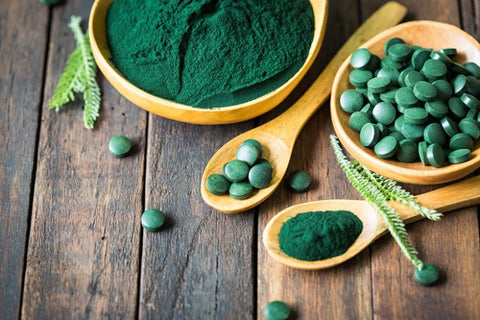Dr. Giuseppe De Matteis, Biologist who works as a Nutritionist Biologist and professor of herbal medicine, dermatology, hair care and cosmetology in Taranto, illustrates the various properties and benefits of spirulina, an excellent ally to combat fatigue.

Sometimes it can happen to feel excessively tired, fatigued, and with dead batteries. The plausible causes can be the following:
- Convalescence after an illness (flu, infectious diseases, gastroenteritis, etc.)
- Convalescence after surgery
- After an antibiotic treatment
- Overwork
- Eat little
- Etc...
Other times, however, fatigue can be chronic and due to other causes such as:
- Hypothyroidism
- Celiac disease
- Wheat intolerance (pseudoceliachia)
- Anemia
- Chronic fatigue syndrome
- Diabetes
- Other minor causes
Surely the first list is the one that includes the most frequent cases of extemporaneous fatigue, that is when it comes to a transitional period due to contingent causes. In fact, everyone can happen to be convalescing after an illness, to undergo surgery or to take an antibiotic.
WHAT TO DO?
Usually if you go to your doctor, the latter prescribes vitamins, a solution that can be fully shared, but it remains to be defined on what type of vitamins or product to choose. Let's not forget that in many cases, supplements contain synthetic vitamins and you believe that our body cannot distinguish a natural vitamin from one made in the laboratory? Of course he knows how to distinguish.
The solution is only one: take a remedy rich in vitamins and natural ingredients, like a food. As often happens, nature comes to meet us with a fantastic solution: spirulina algae . Let's now take a closer look at the topic.
THE SPIRULINA
Spirulina algae ( Arthrospira platensis and maxima ) is part of the cyanobacteria family, unicellular organisms also known by the name of blue algae or blue-green algae.
It lives mainly and is cultivated in the fresh water of sub-tropical areas. It has a blue-green color and the typical spiral shape gave it its name.
Its use has been known for hundreds of years among local populations, even before its discovery by science, who also use it to make bread and focaccia.
Spirulina algae was cultivated above all by the Aztecs near Lake Texcoco, where women took it even during pregnancy; now it is also cultivated in Europe and Italy, in the lake areas.
Spirulina is recognized by the EFSA (European Food Safethy Authority) as a "food ingredient". For this reason it can be offered for sale in the form of a supplement , as an ingredient in its own right or as an ingredient contained within other products intended for trade, including those of a cosmetic nature.

To be cultivated in nature it needs tropical or subtropical lakes, which have high aquatic concentrations of bicarbonate and carbonate, as well as a decidedly high pH.
Here is what spirulina algae contains :
Vitamin B1 |
2.4 mg |
Vitamin B2 |
3.7 mg |
Vitamin B3 |
12.8 mg |
Vitamin B5 |
3.5 mg |
Vitamin B6 |
0.35 mg |
Vitamin A |
250 IU |
C vitamin |
10 mg |
Vitamin E |
5 mg |
Vitamin K |
25 mg |
Beta-carotene |
340 mcg |
Folate |
95 mcg |
Potassium |
1363 mcg |
Phosphorus |
118 mg |
Magnesium |
195 mg |
Soccer |
120 mg |
In addition to vitamins and minerals , it also contains:
- Proteins
- Essential amino acids
- Chlorophyll
- Carotenoids
- Omega 3 and omega 6 polyunsaturated lipids , gammalinoleic acid
The latter in particular, balanced between them, can help improve blood cholesterol levels, help normalize blood pressure , participate in the formation of myelin sheaths that line the nerves and strengthen the immune system . Being rich in amino acids, it also lends itself well as a source of amino acids for vegans who do not consume animal proteins.
It also contributes to keeping fit as it reduces body weight and hunger and also promotes evacuation.
Spirulina algae also contains a large amount of phycocyanin which has the following properties:
- Protects liver and kidney cells
- Promotes the elimination of waste substances from the blood
- Regenerates red blood cells
Furthermore, being rich in iron , it also supports very well in case of excessive blood loss during the menstrual cycle. Also not to be forgotten is its richness in SOD , superoxide dismutase enzyme, anti-free radical par excellence, and therefore anti- aging and support to protect cells from oxidative stress. It can also promote fertility , in association with other therapies.
It does not contain iodine, unlike fucus, so there is no contraindication in the case of thyroid diseases. It can also be taken during pregnancy and breastfeeding. Not bad, right? And it is all natural, for this reason spirulina is considered to all intents and purposes a food and also a superfood .
Discover Spirutonic at 30%!
